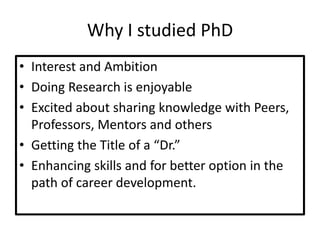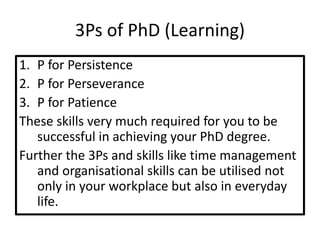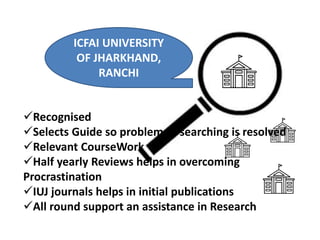Experience sharing by Research Scholar
- 1. Experience sharing by Research Scholar Dr. Ruphsa Roy Date: 16th July 2020 Time:9:05 to 10:05 am
- 2. My Profile Name: Dr. Rupsha Roy Academic Qualification: 1. Doctorate from ICFAI University Jharkhand, Ranchi on 2017 2. Topic ŌĆØ Analysis of coping strategies in the face of occupational hazards - A study of white collar employees of education sector in West Bengal (India)ŌĆØ 2. MBA in HR from Viswa Bharati University , Santiniketan Experience: Currently Associated with Amity University, Kolkata 1. 14 yrs experience in Corporate as HR manager, Technical Manager 2. 14 yrs experience in Academics both in teaching and administration.
- 3. I Acknowledge All who played an Important role in my PhD completion ŌĆó Honourable VC: Prof. O. R. S. Rao ŌĆó My Guide: Dr. Bijoya Ganguly ŌĆó My Co-Guide: Dr. Soumendranath Bagchi ŌĆó My Friend and Philosopher: Dr. Rumna Bhattacharya ŌĆó IUJ Staff and Faculty Members ŌĆó Finally my parents, friends & Colleagues
- 5. PhD WHAT? ŌĆó A PhD is the highest title you can obtain in academia which qualifies you to become a University Professor in your subject area. WHY? 1. You are recognized as an expert in your field 2. You possess superior theoretical and applied knowledge on your subject 3. You also develop a set of transferrable skills, such as problem-solving, critical reasoning, and in- depth analysis from diverse angles and perspectives
- 6. Why I studied PhD ŌĆó Interest and Ambition ŌĆó Doing Research is enjoyable ŌĆó Excited about sharing knowledge with Peers, Professors, Mentors and others ŌĆó Getting the Title of a ŌĆ£Dr.ŌĆØ ŌĆó Enhancing skills and for better option in the path of career development.
- 7. Benefits On Personal Front ŌĆó You may find that you feel more confident and have greater self-belief. ŌĆó You are mentally mature through receiving challenge and criticism from your peers and supervisors. ŌĆó You will also learn that any failure is a step closer to success, and hence find that you are less worried about failure or the uncertainty that surrounds your actions.
- 8. 3Ps of PhD (Learning) 1. P for Persistence 2. P for Perseverance 3. P for Patience These skills very much required for you to be successful in achieving your PhD degree. Further the 3Ps and skills like time management and organisational skills can be utilised not only in your workplace but also in everyday life.
- 9. How to get PhD Steps in attaining PhD:- 1. Choose the University 2. Search for a Guide 3. Choose the Topic 4. Schedule your activities for completion
- 10. Choose the University ŌĆó University should be recognised ŌĆó University should help you in allotting a guide for you ŌĆó Proper Course Work relevant to research ŌĆó Course structure helping to overcome Procrastination behaviour ŌĆó Continuous support in matters of guidance, materials, suggestion and publications
- 11. ICFAI UNIVERSITY OF JHARKHAND, RANCHI ’ā╝Recognised ’ā╝Selects Guide so problem of searching is resolved ’ā╝Relevant CourseWork ’ā╝Half yearly Reviews helps in overcoming Procrastination ’ā╝IUJ journals helps in initial publications ’ā╝All round support an assistance in Research
- 12. To choose a Topic First you need to answer the following Questions 1. Can you enthusiastically pursue it? 2. Can you sustain your interest while pursuing it? 3. Is the problem solvable? 4. Is it worth pursuing? 5. Will it lead to other research problems? 6. Is it manageable in size? 7. What is the potential for making an original contribution to the literature in the field? 8. Will the scholars in your field receive the results well if you solve the problem? 9. Are you (or will you become) competent to solve it? 10. By solving it, will you have demonstrated independent skills in your discipline? 11. Will the necessary research prepare you in an area of demand or promise for the future?
- 13. 3 Common mistakes done While Selecting the Topic 1. Extending thesis work even after graduate school: If researchers choose topics that are direct extensions or clear derivatives of their thesis work, then they do not make significant value addition to the respective field of study. Choosing a radically new research topic, while still embarking on the broad area of specialization is indeed the key to success.
- 14. 3 Common mistakes done While Selecting the Topic 2. Choosing an obscure, irrelevant, or non- compelling research topic: This can adversely affect the researcherŌĆÖs motivation levels and can drastically decrease their odds of attaining success.
- 15. 3 Common mistakes done While Selecting the Topic 3. Letting PhD advisors choose research topics for you: Although researchers often pursue work within the same field even after earning their PhD, they are less likely to conduct research on the same exact topic. For this reason, letting your advisor tell you what to study rather than you developing a question based on your own reading and experiences in the laboratory is another common mistake that can have lifelong consequences..
- 16. Schedule you Activities for Completion Time Period / Activities 1 2 3 4 5 6 7 Topic Agreed Y Aims & Objectives Y Literature Review & Finding the research Gap Y Y Identifying Methodology Y Preparing Data Collection Tools Y Y Collecting Data Y Y Y Analysing Data Y Y Drafting the Thesis Y Y Y Y Y
- 17. My PhD Journey ŌĆó Journey started long back in 2006 when I have migrated from Corporate to Academics only it was in the form of a desire in my mind. ŌĆó Actual Journey started in 2012 When I gave my Research Aptitude Test for PhD Programme from IUJ whose reasons I have already mentioned
- 18. Excitement Period: ŌĆóAdmission to PhD Programme successful ŌĆóCourse Work started ŌĆóGuide Selection was in process and accepted by Guide ŌĆóSearching for topic was in process and finally selected the topic with the help of guide ŌĆóTopic Registration complete
- 19. Ignorance Period ŌĆó Thought it will be smooth and sailing and hence relaxed attitude ŌĆó Long time to go , no worries. Procrastinating attitude ŌĆó Inconsistent reading and writing and choosing only what I felt I want.
- 20. Struggling Period ŌĆó Felt like lost in jungle. Full of confusion and uncertainty ŌĆó What I am getting myself into. Both internal and external doubts ŌĆó Exhausted during qualitative process. OMGOSHSSSSSSSŌĆ”ŌĆ”
- 21. Self Lifting Period ŌĆó Replanned Moved Forward step by step. ŌĆó Attended workshops and seminars ŌĆó Talked to other people who have already achieved their Doctoral Degree
- 22. Journey Continued Assuring Periods ŌĆó Co-Authoring Papers ŌĆó Understanding what I did not.. ŌĆó Balancing between learning new things and maintaining the main study.
- 23. Seeing the light at the end of the tunnel Annalysing and Writing Continuing to keep learning and writing for final submission
- 24. Learning Experiences ŌĆó See Priorities and Obey Them ŌĆó Always Plan, Set Deadline & take corrective action ŌĆó Have consistent discussion with Supervisor ŌĆó Talk to others & learn from them ŌĆó Invest in study - time, effort & money ŌĆó Be positive , open minded and take the challenge ŌĆó Keep feet on the ground ŌĆó DonŌĆÖt be afraid to make mistakes or look silly
- 25. DoŌĆÖs & DonŌĆÖtŌĆÖs DoŌĆÖs: ŌĆó Be accountable to study invest in it ŌĆó ŌĆśAddŌĆÖ SUPERVISOR as good friend ŌĆó Learn from others, share with others ŌĆó Backup all files & keep record regularly ŌĆó Be happy & content & Thankful to IUJ DonŌĆÖtŌĆÖs ŌĆó Languish, Procrastinate ŌĆó Get over things quickly ŌĆó Assume supervisor or staff will do your task ŌĆó Take offence easily ŌĆó Forget the ones who guide and help you.
- 26. Thank You for Listening Some inspiring Quotes which are helpful ŌĆóŌĆ£If you canŌĆÖt explain it SIMPLY, you donŌĆÖt understand it well enoughŌĆØ. ŌĆō Albert Einstein ŌĆóŌĆ£The illiterate of 21st century will not be those who cannot read and write, But those who cannot learn, unlearn or relearnŌĆØ - Alvin Toffler ŌĆóŌĆ£If you do not invest time to prepare, you will waste time to repairŌĆØ - Unknown


























